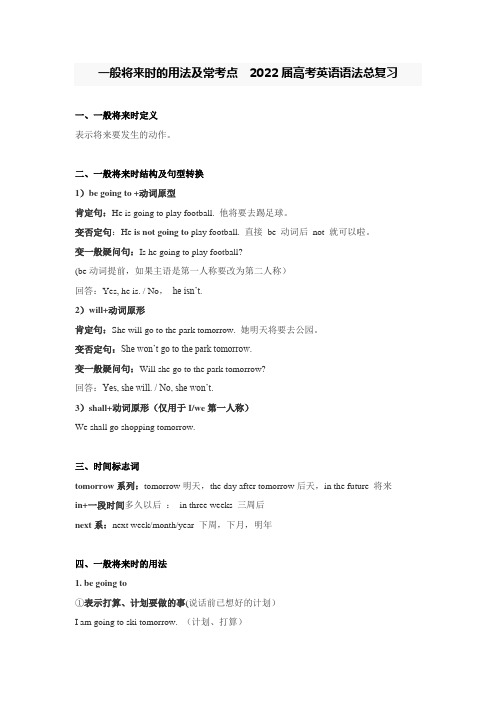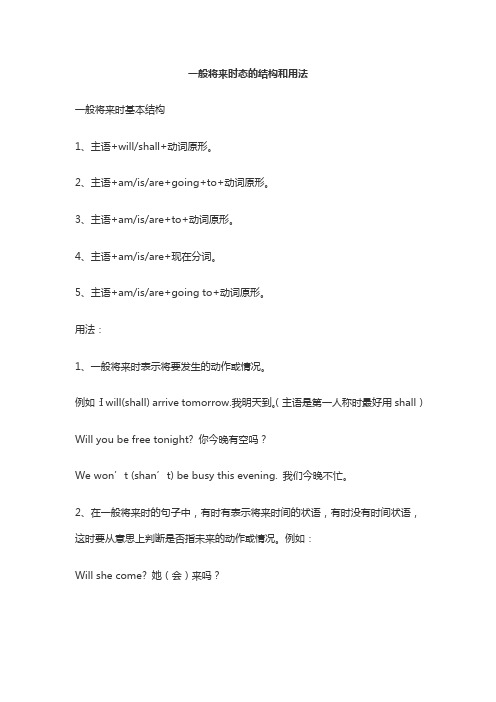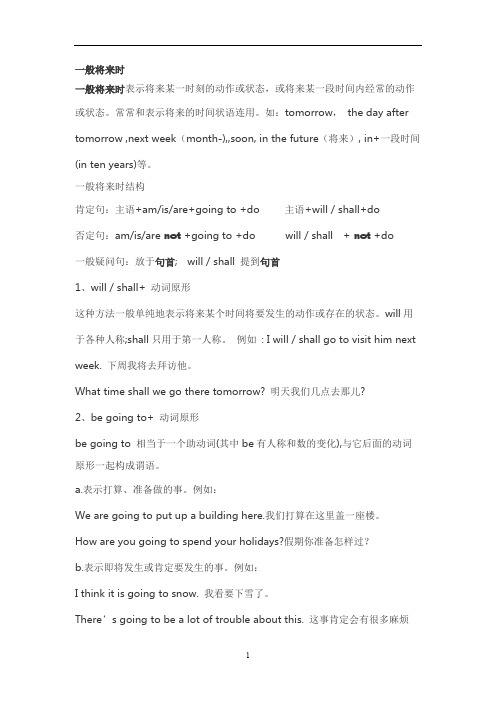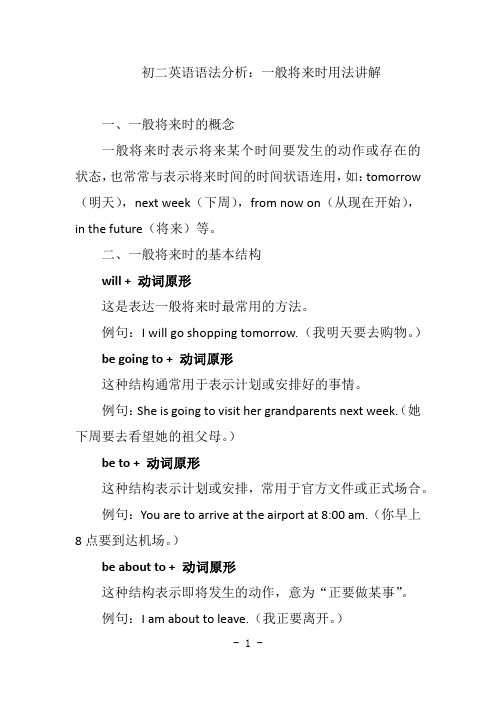一般将来时的定义结构例句用法
一般将来时的用法及常考点 高考英语语法总复习

一般将来时的用法及常考点2022届高考英语语法总复习一、一般将来时定义表示将来要发生的动作。
二、一般将来时结构及句型转换1)be going to +动词原型肯定句:He is going to play football. 他将要去踢足球。
变否定句:He is not going to play football. 直接be 动词后not 就可以啦。
变一般疑问句:Is he going to play football?(be动词提前,如果主语是第一人称要改为第二人称)回答:Yes, he is. / No,he isn’t.2)will+动词原形肯定句:She will go to the park tomorrow. 她明天将要去公园。
变否定句:She won’t go to the park tomorrow.变一般疑问句:Will she go to the park tomorrow?回答:Yes, she will. / No, she won’t.3)shall+动词原形(仅用于I/we第一人称)We shall go shopping tomorrow.三、时间标志词tomorrow系列:tomorrow明天,the day after tomorrow后天,in the future 将来in+一段时间多久以后:in three weeks 三周后next系:next week/month/year 下周,下月,明年四、一般将来时的用法1. be going to①表示打算、计划要做的事(说话前已想好的计划)I am going to ski tomorrow. (计划、打算)我明天要去滑雪。
②有迹象表明要发生的事。
Loot at the dark clouds. It is going to rain. (迹象表明)2. Will①当下的决定(说话时才做的决定)- My car won’t start.- Don’t worry, I will come and give it a push.②表示一个将来的动作或状态,“要…,会…”She will go to school tomorrow.③表示不以人的意志为转移的自然发展的事。
一般将来时态的结构和用法

一般将来时态的结构和用法一般将来时基本结构1、主语+will/shall+动词原形。
2、主语+am/is/are+going+to+动词原形。
3、主语+am/is/are+to+动词原形。
4、主语+am/is/are+现在分词。
5、主语+am/is/are+going to+动词原形。
用法:1、一般将来时表示将要发生的动作或情况。
例如:I will(shall) arrive tomorrow.我明天到。
(主语是第一人称时最好用shall)Will you be free tonight? 你今晚有空吗?We won’t (shan’t) be busy this evening. 我们今晚不忙。
2、在一般将来时的句子中,有时有表示将来时间的状语,有时没有时间状语,这时要从意思上判断是否指未来的动作或情况。
例如:Will she come? 她(会)来吗?3、在以第一人称I或we作主语的问句中,一般使用助动词shall,这时或是征求对方的意见,或是询问一个情况(b):a. Where shall we meet? 我们在哪儿碰头?b. Shall we have any classes tomorrow?明天我们有课吗?在这类问句中,近几年来也有不少人用will,特别是在美国。
例如:How will I get there? 我怎么去?扩展资料:一般将来时表示将来某一时段的动作或状态,或将来某一段时间内经常的动作或状态。
在英语时态中,“时“指动作发生的时间,”态“指动作的样子和状态。
一般将来时常常和表示将来的时间状语连用。
如:tomorrow(明天),next week (下周);in the future(将来);in a year(一年以后)等。
一般将来时由助动词shall(第一人称),will(所有人称)动词原形构成。
美式英语则不管什么人称,一律用will。
或用主语+be动词+ going to 动词(be going to)。
一般将来时用法及例句

一般将来时一般将来时表示将来某一时刻的动作或状态,或将来某一段时间内经常的动作或状态。
常常和表示将来的时间状语连用。
如:tomorrow,the day after tomorrow ,next week(month-),,soon, in the future(将来), in+一段时间(in ten years)等。
一般将来时结构肯定句:主语+am/is/are+going to +do 主语+will / shall+do否定句:am/is/are not +going to +do will / shall + not +do一般疑问句:放于句首; will / shall 提到句首1、will / shall+ 动词原形这种方法一般单纯地表示将来某个时间将要发生的动作或存在的状态。
will用于各种人称;shall只用于第一人称。
例如: I will / shall go to visit him next week. 下周我将去拜访他。
What time shall we go there tomorrow? 明天我们几点去那儿?2、be going to+ 动词原形be going to 相当于一个助动词(其中be有人称和数的变化),与它后面的动词原形一起构成谓语。
a.表示打算、准备做的事。
例如:We are going to put up a building here.我们打算在这里盖一座楼。
How are you going to spend your holidays?假期你准备怎样过?b.表示即将发生或肯定要发生的事。
例如:I think it is going to snow. 我看要下雪了。
There’s going to be a lot of trouble about this. 这事肯定会有很多麻烦一、选择填空:( ) 1. There __________ a meeting tomorrow afternoon.A. will be going toB. will going to beC. is going to beD. will go to be( ) 2. Charlie ________ here next month.A. isn’t workingB. doesn’t workingC. isn’t going to workingD. won’t work( ) 3. He ________ very busy this week, he ________ free next week.A. will be; isB. is; isC. will be; will beD. is; will be( ) 4. There ________ a dolphin show in the zoo tomorrow evening.A. wasB. is going to haveC. will haveD. is going to be( ) 5. –________ you ________ free tomorrow?– No. I ________ free the day after tomorrow.A. Are; going to; willB. Are; going to be; willC. Are; going to; will beD. Are; going to be; will be ( ) 6. Mother ________ me a nice present on my next birthday.A. will givesB. will giveC. givesD. give( ) 7. – Shall I buy a cup of tea for you?–________. (不,不要。
初二英语语法分析--一般将来时用法讲解

初二英语语法分析:一般将来时用法讲解一、一般将来时的概念一般将来时表示将来某个时间要发生的动作或存在的状态,也常常与表示将来时间的时间状语连用,如:tomorrow (明天),next week(下周),from now on(从现在开始),in the future(将来)等。
二、一般将来时的基本结构will + 动词原形这是表达一般将来时最常用的方法。
例句:I will go shopping tomorrow.(我明天要去购物。
)be going to + 动词原形这种结构通常用于表示计划或安排好的事情。
例句:She is going to visit her grandparents next week.(她下周要去看望她的祖父母。
)be to + 动词原形这种结构表示计划或安排,常用于官方文件或正式场合。
例句:You are to arrive at the airport at 8:00 am.(你早上8点要到达机场。
)be about to + 动词原形这种结构表示即将发生的动作,意为“正要做某事”。
例句:I am about to leave.(我正要离开。
)be due to + 动词原形这种结构表示某事预定或预期将要发生。
例句:The train is due to arrive at 5:00 pm.(火车预定下午5点到达。
)三、一般将来时的用法1表示将来的动作或状态例句:I will buy a new car next year.(明年我要买一辆新车。
)2表示将来的计划或安排例句:We are going to have a picnic this weekend.(我们这个周末要去野餐。
)3表示根据现有情况推测未来的可能性例句:It's going to rain soon.(很快就要下雨了。
)4表示命令、请求、建议等例句:You are to finish your homework before you go out.(你出去之前要把作业做完。
一般将来时知识点

一般将来时知识点一般将来时是英语中常用的一种时态,用来表示将来发生的动作或状态。
在句子中,一般将来时通常由助动词"will"或"shall"加动词原形构成。
除了表示将来的动作或状态外,一般将来时还可以表示决心、意图、预测、承诺以及请求等不同的语义。
下面是一些一般将来时的知识点:1.一般将来时的基本结构:主语 + will/shall + 动词原形+ …例如:- I will visit my grandparents tomorrow.(我明天会去看望我的祖父母。
)- He shall help you with the project.(他会帮助你完成这个项目。
)2.一般将来时的否定形式:主语 + will not/shall not + 动词原形+ …例如:- They will not arrive on time.(他们不会准时到达。
)- She shall not attend the meeting.(她不会参加会议。
)3.一般将来时的疑问形式:将助动词"will"或"shall"提前到句子的主语之前,并且将句末的问号加在句子结束处。
例如:- Will you come to the party?(你会来参加聚会吗?)- Shall we go for a walk?(我们去散步好吗?)4.一般将来时与时间状语的搭配:一般将来时经常和表示将来时间的状语词或短语一起使用,如:tomorrow(明天)、next week(下周)、in the future(在未来)等。
例如:- We will have a meeting tomorrow.(我们明天有个会议。
)- She shall complete the report next week.(她下周会完成这份报告。
)5.一般将来时表示打算、意图:一般将来时也经常用来表示打算、意图或计划要做某事。
一般将来时的构成和用法

一般将来时的构成和用法一般将来时是英语中用来表达将来发生的动作或事件的时态。
它的构成相对简单,一般由助动词“will”+动词原形构成。
在某些情况下,也可以使用“be going to”来表示将来时。
一、构成1. “will + 动词原形”二十年后,我将会是一名成功的科学家。
Twenty years from now, I will be a successful scientist.2. “be going to + 动词原形”明天,我打算去购物。
I am going to go shopping tomorrow.二、用法1. 表示计划或意图我明天打算学习数学。
I will study math tomorrow.2. 表示预测或猜测我认为明天会下雨。
I think it will rain tomorrow.3. 表示承诺或意愿我会帮你完成这个项目。
I will help you with this project.4. 表示打算或决定我打算明天早上锻炼身体。
I am going to exercise in the morning.5. 表示预定或安排明天我将和朋友们去看电影。
I will go to the movies with friends tomorrow.三、注意事项1. 一般将来时通常与表示将来的时间状语连用,比如tomorrow(明天)、next week(下周)、in the future(将来)等。
2. 当表示按计划或安排好的未来事件时,一般使用“be going to”而不是“will”,因为“be going to”强调的是事先的决定或计划。
3. 一般将来时所表示的动作或事件并不一定是肯定会发生的,而是说话人的预测、打算、意愿等。
四、例句1. 我将和朋友一起去看电影。
I will go to the movies with my friends.2. 我会告诉你事情发生的细节。
一般将来时态的结构和用法
一般将来时态的结构和用法一般将来时态是用来表达在现在之后还会发生的动作、事件或情况。
它使用来表示将来的时间,并常常与时间状语连用,以增强时间的准确性。
一般将来时态是英语中最简单的将来时态形式。
在这篇文章中,我们将详细介绍一般将来时态的结构和用法。
一、一般将来时态的结构- I will go to the party tonight.(我今晚会去参加派对。
)- They will visit their grandparents next week.(他们下周会去看望他们的祖父母。
)- She'll take a vacation next month.(下个月她将休假。
)在一般将来时态的肯定句中,助动词“will”和动词的原形之间没有其他词语。
然而,如果主语是第三人称单数,则需要在助动词“will”后面加上动词的第三人称单数形式(加上“s”或“es”)。
例如:- He will go to the party tonight.(他今晚会去参加派对。
)- I will not go to the party tonight.(我今晚不会去参加派对。
)- They won't visit their grandparents next week.(他们下周不会去看望他们的祖父母。
)- She won't take a vacation next month.(下个月她不会休假。
)- Will you go to the party tonight?(今晚你会去参加派对吗?)- Will they visit their grandparents next week?(他们下周会去看望他们的祖父母吗?)- Will she take a vacation next month?(下个月她会休假吗?)二、一般将来时态的用法1.表示未来计划或打算:一般将来时态经常用来表示人们的未来计划或打算。
英语一般将来时的用法
英语一般将来时的用法摘要:1.英语一般将来时的概念2.英语一般将来时的构成3.英语一般将来时的用法实例正文:英语一般将来时是表示将来某个时间要发生的动作或存在的状态,通常用于表示计划、安排、意图、预测等。
一般将来时与现在时、过去时相对应,是英语时态中的三大基本时态之一。
英语一般将来时的构成有两种:1.be going to + 动词原形:表示计划、安排、意图等,强调动作的将来性。
例如:I am going to study English tomorrow.(我明天要学英语。
)2.will + 动词原形:表示将来的客观事实、预测等,强调动作的确定性。
例如:It will rain tomorrow.(明天会下雨。
)英语一般将来时的用法实例:1.表示计划、安排、意图等- I am going to travel around the world next year.(我明年要去环游世界。
)- She will learn to play the piano after graduation.(她毕业后要学弹钢琴。
)2.表示将来的客观事实、预测等- The sun will rise in the east.(太阳会从东方升起。
)- Spring will come soon.(春天即将到来。
)3.在某些条件句中,一般将来时表示将来可能发生的情况- If it rains, I will stay at home.(如果下雨,我会待在家里。
)- If he studies hard, he will pass the exam.(如果他努力学习,他会通过考试。
)通过以上分析,我们可以看出英语一般将来时在实际应用中的重要性。
一般将来时的构造和用法
一般将来时的构造和用法一般将来时是英语中表示将来发生的动作或事件的时态。
它用来描述将来某一时间或情况下预计会发生的事情。
一般将来时的构造和用法有以下几种。
1. 肯定句结构:主语 + will + 动词原形 + 其他2. 否定句结构:主语 + will + not + 动词原形 + 其他3. 一般疑问句结构:Will + 主语 + 动词原形 + 其他?4. 特殊疑问句结构:特殊疑问词 + will + 主语 + 动词原形 + 其他?下面将分别对这些句子结构进行详细解释和示例。
1. 肯定句结构:主语 + will + 动词原形 + 其他肯定句结构用于表达预测、打算、意愿和承诺等将来发生的动作或事件。
以下是一些例句:- I will go shopping tomorrow.(我明天会去购物。
)- They will visit their grandparents next week.(他们下周会去拜访他们的祖父母。
)- She will study abroad next year.(她明年会出国留学。
)2. 否定句结构:主语 + will + not + 动词原形 + 其他否定句结构表示将来某一时间或情况下不会发生的动作或事件。
以下是一些例句:- He will not attend the meeting tomorrow.(他明天不会参加会议。
)- We will not travel to Europe next summer.(我们下个夏天不会去欧洲旅行。
)- The party will not start until 8 p.m.(晚会直到晚上8点才开始。
)3. 一般疑问句结构:Will + 主语 + 动词原形 + 其他?一般疑问句结构用来询问预测、打算、意愿和承诺等将来发生的动作或事件是否会发生。
以下是一些例句:- Will you attend the conference tomorrow?(你明天会参加会议吗?)- Will they come to our party this weekend?(他们这个周末会来我们的派对吗?)- Will she finish her project on time?(她会按时完成她的项目吗?)4. 特殊疑问句结构:特殊疑问词 + will + 主语 + 动词原形 + 其他?特殊疑问句结构用来询问关于将来动作或事件的特定信息。
一般将来时态的结构和用法
一般将来时态的结构和用法1、一般将来时的时态结构有两种。
(1)主语+shall/will+动词原形+其他。
这里的shall 用于主语是第一人称的句子中,will用于主语是任何人称的句子中。
(2)主语+be going to+动词原形+其他。
这里的主语没有人称的限制。
2、一般将来时的用法(1)“主语+shall/will+动词原形+其他”表示将来的动作或状态。
常和tomorrow, next week, from now等表示将来的时间状语连用。
例句①:We shall be known better than any preceding generations.语法:这是一个简单句,时态是一般将来时,谓语是shall be known,表示将来的动作。
译文:我们将比先辈更为后代所了解。
例句②:One or more of the tour guides will welcome you there and brief you about what the tour will be about.语法:这是一个主从复合句。
what引导的是宾语从句;主句和从句的时态都是一般将来时,谓语分别是will welcome…and brief和will be,表示将来的动作。
译文:有一个或几个导游会到那里迎接你们,并且向你们简要介绍参观的内容。
(2)“be going to+动词原形+其他”表示事先考虑过的将要发生的动作以及已有迹象表明必将要发生的某事,意为“打算,就要”。
例句:Now we go to Jane who is going to tell us about what's happening in town this weekend.语法:这是一个多重主从复合句。
who引导的是定语从句,该从句的时态是一般将来时,谓语是is going to tell;该定语从句中又包含一个由what引导的宾语从句,作介词about的宾语。
- 1、下载文档前请自行甄别文档内容的完整性,平台不提供额外的编辑、内容补充、找答案等附加服务。
- 2、"仅部分预览"的文档,不可在线预览部分如存在完整性等问题,可反馈申请退款(可完整预览的文档不适用该条件!)。
- 3、如文档侵犯您的权益,请联系客服反馈,我们会尽快为您处理(人工客服工作时间:9:00-18:30)。
一般将来时 一、定义 一般时表示将来某一时刻的动作或状态,或将来某一段时间内经常的动作或状态。常常和表示将来的时间状语连用。 如:tomorrow(明天), next week(下周 );in the future(将来)等。 一般将来时由助动词shall(),will(第二、三人称) 动词原形构成。美国英语则不管什么人称,一律用will。
二、结构 (一)常见结构 1、will / shall + 动词原形(否定句在will/shall后加not) 这种方法一般单纯地表示将来某个时间将要发生的动作或存在的状态。will用于各种人称;shall只用于第一人称。 例如: I will / shall go to visit him next week. 下周我将去拜访他。 What time shall we go there tomorrow 明天我们几点去那儿 2、be going to+动词原形 be going to 相当于一个助动词(其中be有人称和数的变化),与它后面的动词原形一起构成。用来表示将要发生的动作以及计划、安排和打算要做的事。 例如: There is going to be a football match this afternoon.今天下午将有一场足球赛。 I‘m going to go to the park. 我将要去公园。 (二)常用结构 1、用于"I expect, I'm sure, I think, I wonder等的"中。 Don't worry about the exam. I'm sure you'll pass. 不要担心这次考试,我确信你会通过的。 2、用于和陈述句中。 Work hard and you will succeed. 如果你努力,就会成功的。 3、与表示时间或条件的连用。 I'll let you know as soon as he arrives. 他一到我就通知你。 三、例句 (1)He will get married. 他就快结婚了[1] (2)She will have a daughter.她就会有个女儿了 (3)The cat will have a master.猫要有主人了 (4)The dog will have a house. 狗就要有窝了 (5)Telephone me this evening. I‘ll be at home. 今晚给我打电话,我会在家。 (6)I'll(shall/will)do a better job next time. 下次我要干得好 (7)The car won‘t start.车开不了啦。 (8)Oil and water will not mix. 油水没法混在一起。 四、用法 (一)一般将来时表示将要发生的动作或情况。 例如:I will(shall) arrive tomorrow.我明天到。(主语是第一人称时最好用shall) Will you be free tonight 你今晚有空吗 We won’t (shan’t) be busy this evening. 我们今晚不忙。 (二)在一般将来时的句子中,有时有表示将来时间的,有时没有,这时要从意思上判断是否指未来的动作或情况。 例如:Will she come 她(会)来吗 (三)在以第一人称I或we作主语的问句中,一般使用助动词shall,这时或是征求对方的意见,或是询问一个情况(b): a. Where shall we meet 我们在哪儿碰头 b. Shall we have any classes tomorrow明天我们有课吗 在这类问句中,近几年来也有不少人用will,特别是在。例如:How will I get there 我怎么去 (四)be going to+ a.表示计划、打算、准备做的事。 例如:We are going to put up a building here.我们打算在这里盖一座楼。 How are you going to spend your holidays假期你准备怎样过 b.表示即将发生或肯定要发生的事。例如: I think it is going to snow. 我看要下雪了。 (五)其他用法 表示将来某一时刻的动作或状态,其表达形式除了“shall(第一人称),will(第二、三人称)+动词原形构成”外,还有以下几种形式。 1、“be going to+动词原形”表示即将发生的或打算进行的事。 例如: ①It is going to rain. 要下雨了。 ②We are going to have a meeting today. 今天我们开会。 2、go, come,start,move,sail,leave,arrive,stay,live, fly,等可用进行表示按计划即将发生的动作(行进式动词)。 例如:I'm leaving for Beijing. 3、“be to+动词原形”表示按计划要发生的事或征求对方意见。 例如: ①Are we to go on with this work我们继续干吗 ②The boy is to go to school tomorrow.这个男孩明天要去上学。 4、“be about to+动词原形”表示即将发生的动作,意为:立刻,马上。后面一般不跟时间状语。 例如: We are about to leave.我们马上就走。 5、某些词,如come, go, leave, arrive, start, get, stay ,live, fly等的也可表示将来。 ①The meeting starts at five o'clock.会议五点开始。 ②He gets off at the next stop.他下一站下车。 6、“be due to"构成的谓语,意味“定于…”也可表示将来时 此外:will与be going to 的分别 be going to与will两者都可表示将要发生的事、将要去做某事,但它们有如下几点区别: 1. be going to 表示将要发生的事情,will 表示的时间则较远一些,如: He is going to write a letter tonight. He will write a book one day. 2. be going to 表示根据主观判断将来肯定发生的事情,will表示客观上将来势必发生的事情。 He is seriously ill. He is going to die. He will be twenty years old. 3. be going to 含有“计划,准备”的意思,而 will 则没有这个意思,如: She is going to lend us her book. He will be here in half an hour. 4.在有条件的主句中,一般不用 be going to, 而多用will, 如: If any beasts comes at you, I'll stay with you and help you 注意 be going to和will在含义和用法上稍有不同。be going to往往表示事先经过考虑的打算;will多表示意愿,决心。两者有时不能互换。如: She is studying hard and is going to try for the exams.她正努力学习并尝试参加考试。(is going to不能用will替换)
主将从现 主将从现是指在和和中,如果是一般将来时,用一般现在时替代一般将来时。“主将从现”常见的有以下四种情况: 一、时间的主句是一般将来时,那么从句常常用一般现在时。 如: When I grow up, I’ll be a nurse and look after patients. 我长大后要当一名护士,照顾病人。 二、如果主句是祈使句,那么从句通常要用一般现在时 如:Don’t laugh at me when I make a mistake. 我犯错误的时候不要笑话我。 三、如果主句是含有情态动词的一般现在时,根据需要从句多用一般现在时 如:You should be quiet when you are in the reading room 在阅览室时应保持安静。 四、 如果if的条件状语从句遇到变换间接和直接时 , 祈使句应用not to.... 如; She said not to close the window 常见的时间状语从句的连词有:as soon as,when,while ,as,until等 主将从现说的是在含有时间状语从句和条件状语从句的主从复合句中,如果主句的时态是一般将来时,那么从句要用一般现在时。例如: I will tell him about it when he comes. If it is fine tomorrow, we will go outing. 如果主句的时态是过去将来时,那么从句要用一般过去时。例如: He said that he would have another try if he had the chance. I knew he could help me if he was free the next day. 主要标志有:if 、unless 、until、 when 、as soon as
